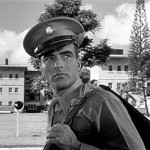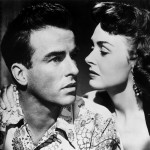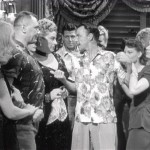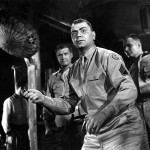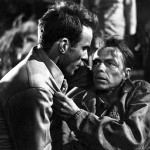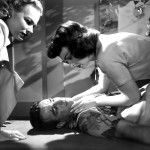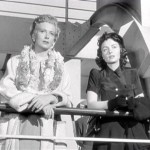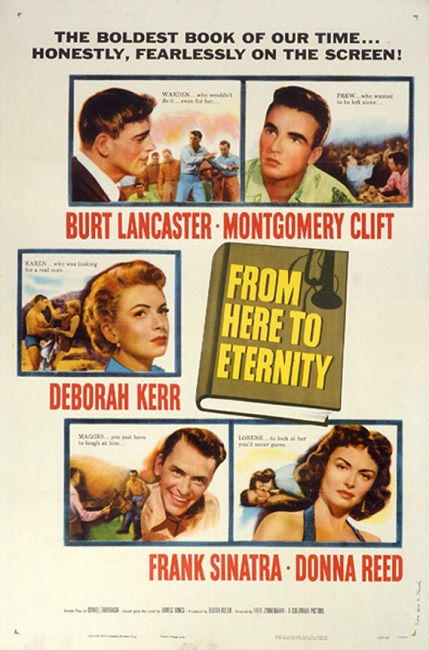
From Here to Eternity – 1953
Here we have another war-time drama, this one taking place in Hawaii in 1941, just before the bombing of Pearl Harbor. The tragic event took place on December 7th, a date which President Roosevelt called “a date which will live in infamy.” However the entire film actually takes place in the months leading up to the attack. The movie was nominated for thirteen Academy Awards and won eight. Fred Zinnemann won for Best Director, Frank Sinatra won for Best Supporting Actor, and Donna Reed won for Best Supporting Actress.
I can easily see why this was such a popular movie. It had several things going for it. It had a cast with some pretty big names such as Burt Lancaster, Montgomery Clift, Deborah Kerr, Frank Sinatra, Donna Reed, and even Ernest Borgnine. It was set in an emotional time in our nation’s history that was intimately familiar to its audiences. The attack on Pearl Harbor had taken place only twelve years earlier. It had a somewhat exotic location, and a heavily dramatic plot.
Most of the movie actually moved a little slow. It seemed like it was all set-up for the last forty minutes of the film. We start out as a young bugler, Robert E. Lee Prewitt (Clift) arrives on the island of Oahu, wanting just to play his bugle or be an infantry soldier. His Captain, Dana Holms, played by Philip Ober, has other plans for him. You see, Prewitt used to be a good boxer and Holms wants him to be on the company boxing team. Prewitt refuses, saying that he gave up the sport after seriously injuring his sparring partner at his last post. The Captain responds by giving him “the treatment”, forcing him to endure the hardest and most miserable duties army life has to offer. Prewitt stubbornly refuses to box and this goes on for the first hour of the movie.
The next half an hour fleshes out three smaller story-lines. First is First Sargent Milton Warden (Lancaster) as he starts a love affair with Captain Holm’s wife, Karen (Kerr). It is from this that we have that famous scene of the two lovers kissing on the beach as the waves rush over them. It is interesting to note that the film-makers took every opportunity to have Lancaster without his shirt. He was actually pretty fit and muscly. The second story-line followed Private Angelo Maggio (Sinatra) as he gets drunk and makes an enemy of Staff Sergeant James R. Judson (Borgnine). The third story involved Prewitt and his love affair with a hired girl / dance hall hostess, Lorene (Reed).
I can’t say for sure if this movie portrays army life in the 1940s accurately, but all the soldiers seem to be drunks and letches. Whenever they got permission to leave the army base, they immediately got rip-roaring drunk and hit the dance halls. They got into fist-fights that all too quickly turned into knife fights. Was this really the typical life of the American soldier? Did they really behave like that? But the more I think about it, I am guessing that yes, they probably were. First, what else was there to do? Second, audiences in 1953 didn’t question that aspect of the film. In fact, the movie was praised for its realism. Third, the army is known for the machismo of its soldiers. It is easy to imagine that in the 1940s, just as today, drinking, womanizing, and fighting were considered to be manly behavior.
Interesting note: One thing that the movie overlooked in the book, on which it is based, was Private Maggio working as a male hustler, and the gay nightlife of Waikiki. Apparently, in the book, he is paid to have oral sex with another man. I doubt Sinatra would have taken the part if that had made its way into the script.
As it was, Sinatra actually fought to get the part. In fact, he sent letter after letter to the head of the studio, Harry Cohn, asking for the part. After Eli Wallach, who was originally cast as Maggio, walked away from the role to appear on Broadway, Sinatra got the part, and he really did a fine job. I think he deserved his Supporting Actor Oscar. His character was really sort of a tragic one. He was the first to befriend Prewitt while the Captain was mistreating him. But he was also a horrible drunk who got himself into trouble. And in the end, he died as a result of his excessive extreme behavior.
Interesting note: Sinatra’s screen-test was used in the final cut of the film, showing him drunkenly throwing olives across a bar, pretending they were dice.
Burt Lancaster actually did a pretty good job as well. He looked good, and his character was likeable. He did his best to protect Prewitt from the cruelty of Captain Holms in subtle ways. He was believable as the lover and capable as the fighter. As a matter of fact, I thought he was really the only intelligent character in the whole movie. When the inevitable Japanese attack happens, he immediately takes command, saving the lives of many of his troops. Sure, he drank as much as any other soldier, but he proved himself a competent soldier.
But that demonstrates the problem I had with Prewitt, the main character. Prewitt may have been a polite pretty-boy with a conscience, but he was a moron. He made several pretty stupid decisions, eventually getting himself killed by his fellow soldiers. Fortunately, the film didn’t shy away from acknowledging how unintelligent he was. The character knew he wasn’t very smart, but he was really a good guy, so it was alright.
And Finally, I have to mention Donna Reed. Most people know her from The Donna Reed Show and It’s a Wonderful Life. But here she gave a performance with more drama than I am used to seeing from her. Watch for one scene in particular near the end of the film. As her boyfriend, Prewitt, is leaving her home to join the fighting at the army base, even though he is wounded and bleeding, and certain to die needlessly, she frantically, even hysterically begs him not to go. Reed did a great job in that scene.
In the end, I found that I enjoyed the movie – mostly because of Sinatra, who did a great job, and Lancaster, whose character I liked. But also because, though the main plot was a little slow, the three main sub-plots were engaging and interesting to watch. Like I said, it is easy to see why this one was awarded the Academy Award for Best Picture.
